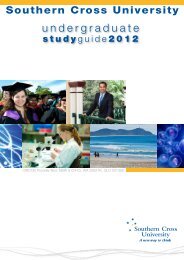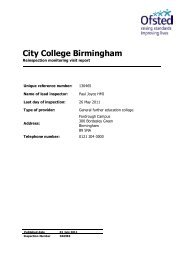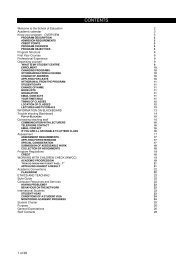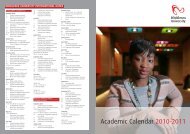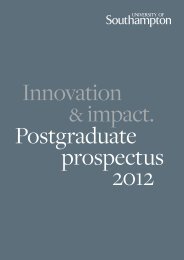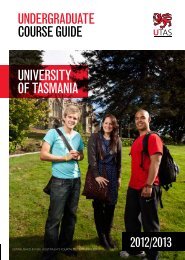Academic calendar Academic calendar - Study in the UK
Academic calendar Academic calendar - Study in the UK
Academic calendar Academic calendar - Study in the UK
Create successful ePaper yourself
Turn your PDF publications into a flip-book with our unique Google optimized e-Paper software.
BIO-248 Forensic Biology *<br />
A course designed to explore <strong>the</strong> biological techniques used <strong>in</strong> forensic<br />
biology. Topics may <strong>in</strong>clude forensic serology, forensic entomology,<br />
DNA analysis, environmental issues relat<strong>in</strong>g to decomposition, decay<br />
rates, <strong>the</strong> collection of specimens and <strong>the</strong> analysis of biological and<br />
physical samples. Includes a weekly three-hour lab.<br />
Prerequisite: BIO-122 or permission of <strong>the</strong> <strong>in</strong>structor<br />
BIO-252 Genetics<br />
(F)*<br />
Discussion of <strong>the</strong> organization, replication, transmission, expression<br />
and evolution of genetic materials. The course is organized around<br />
<strong>the</strong> levels of genes, chromosomes, organisms and populations. Topics<br />
<strong>in</strong>clude <strong>the</strong> expression, control and mutation of genes; <strong>the</strong> molecular<br />
organization and <strong>in</strong>formation cod<strong>in</strong>g; replication, repair, transmission<br />
and mutation of chromosomes; <strong>the</strong> relation between genes, genotype,<br />
phenotype and environment; and <strong>the</strong> genetic structure and variability<br />
of populations, <strong>in</strong>clud<strong>in</strong>g selection and speciation. Throughout <strong>the</strong><br />
course, methods of <strong>in</strong>vestigation will be expla<strong>in</strong>ed. The structure and<br />
operation of genetics as a science will also receive attention. Includes a<br />
weekly three-hour lab.<br />
Prerequisite: BIO-122<br />
BIO-315 Field Biology (ENV-315) *<br />
A course designed to <strong>in</strong>crease <strong>the</strong> exposure of students to organisms<br />
<strong>in</strong> <strong>the</strong>ir field sett<strong>in</strong>gs. Topics discussed <strong>in</strong>clude biogeography, <strong>the</strong><br />
observation of <strong>the</strong> <strong>in</strong>tegration of structural and functional diversity <strong>in</strong><br />
local ecosystems, techniques <strong>in</strong> taxonomy, population sampl<strong>in</strong>g, and<br />
hypo<strong>the</strong>sis test<strong>in</strong>g <strong>in</strong> <strong>the</strong> field. Some field work will be scheduled for<br />
Saturdays. Includes a weekly three-hour lab or field work.<br />
Prerequisite: BIO-235 or permission of <strong>the</strong> <strong>in</strong>structor<br />
BIO-322 Plant Physiology *<br />
An exam<strong>in</strong>ation of physiological mechanisms of plant growth and<br />
development. Topics <strong>in</strong>clude water relations, <strong>the</strong> movement of<br />
water and solutes, photosyn<strong>the</strong>sis, nutrition, <strong>the</strong> production of plant<br />
substances, plant hormones, photomorphogenesis and periodism.<br />
Includes a weekly three-hour lab.<br />
Prerequisite: BIO-122<br />
BIO-336 Physiological Psychology (PSY-336)<br />
(W)*<br />
BIO-341 Mammalian Anatomy and Physiology I<br />
(F)*<br />
An <strong>in</strong>vestigation of <strong>the</strong> anatomy and physiology of mammals and <strong>the</strong>ir<br />
organ systems with special emphasis on <strong>the</strong> nervous, muscular, and<br />
endocr<strong>in</strong>e systems <strong>in</strong> humans. Topics <strong>in</strong>clude <strong>the</strong> needs of an organism,<br />
<strong>the</strong> organization of <strong>the</strong> body and <strong>the</strong> physiology of nerves, muscles and<br />
glands. Includes a weekly three-hour lab.<br />
Prerequisite: BIO-122 or permission of <strong>the</strong> <strong>in</strong>structor<br />
BIO-342 Mammalian Anatomy and Physiology II<br />
(W)*<br />
A cont<strong>in</strong>uation of BIO-341. An <strong>in</strong>vestigation of <strong>the</strong> anatomy and<br />
physiology of mammals and <strong>the</strong>ir organ systems with special emphasis<br />
on <strong>the</strong> homeostatic and reproductive systems of <strong>the</strong> body. Topics<br />
<strong>in</strong>clude cardiovascular regulation, water balance, respiration, digestion<br />
and reproduction. Includes a weekly three-hour lab.<br />
Prerequisite: BIO-341<br />
BIO-352 Developmental Biology *<br />
A study of irreversible biological phenomena at <strong>the</strong> molecular, cellular<br />
and organismal level. Topics <strong>in</strong>clude oogenesis, spermatogenesis,<br />
fertilization, cleavage, morphogenesis, cell <strong>in</strong>teractions, <strong>in</strong>duction, cell<br />
differentiation, pattern formation and sex determ<strong>in</strong>ation. Includes a<br />
weekly three-hour lab.<br />
Prerequisite: BIO-231 or 241 or 252<br />
BIO-362 Microbiology<br />
(F)*<br />
An <strong>in</strong>troductory course which provides an understand<strong>in</strong>g of microbial<br />
structure and biochemistry, and <strong>in</strong>cludes practical experience <strong>in</strong> <strong>the</strong><br />
handl<strong>in</strong>g and ma<strong>in</strong>tenance of microbial cultures. Topics <strong>in</strong>clude <strong>the</strong><br />
classification and identification of micro-organisms, <strong>the</strong> role of microorganisms<br />
<strong>in</strong> health and disease, and <strong>the</strong> application of microbial<br />
processes <strong>in</strong> <strong>in</strong>dustry. Includes a weekly three-hour lab.<br />
Prerequisite: BIO-231 or permission of <strong>the</strong> <strong>in</strong>structor<br />
BIO-365 Biochemistry I (CHE-365)<br />
(F)*<br />
An <strong>in</strong>troduction to <strong>the</strong> structure, function and analysis of <strong>the</strong><br />
major classes of chemicals found <strong>in</strong> liv<strong>in</strong>g organisms: prote<strong>in</strong>s,<br />
carbohydrates, lipids and nucleic acids. An <strong>in</strong>troduction to <strong>the</strong> activity<br />
and analysis of enzymes. Includes a weekly three-hour lab.<br />
Prerequisite: BIO-231 and CHE-264 or permission of <strong>the</strong> <strong>in</strong>structor<br />
BIO-366 Biochemistry II (CHE-366)<br />
(W)*<br />
A cont<strong>in</strong>uation of BIO-365. Topics <strong>in</strong>clude k<strong>in</strong>etics of enzyme<br />
catalyzed reactions, <strong>the</strong>rmodynamics, cofactors, and a study of <strong>the</strong><br />
major degradative and biosyn<strong>the</strong>tic pathways of metabolism. Includes<br />
a weekly three-hour lab.<br />
Prerequisite: BIO-365<br />
BIO-441 Neurobiology<br />
(W)*<br />
This course provides a detailed exploration of <strong>the</strong> basic physiological<br />
processes that occur with<strong>in</strong> <strong>the</strong> nervous systems of various organisms.<br />
Emphasis is placed on <strong>the</strong> <strong>in</strong>vertebrate nervous systems and <strong>the</strong> manner<br />
by which simple systems can be used to ga<strong>in</strong> a better understand<strong>in</strong>g of<br />
<strong>the</strong> mammalian bra<strong>in</strong>. Includes a weekly three-hour lab.<br />
Prerequisite: BIO-341 or 336<br />
BIO-455 Evolutionary Biology<br />
(W)*<br />
An exam<strong>in</strong>ation of <strong>the</strong> <strong>the</strong>ories of biological evolution and <strong>the</strong>ir evidence.<br />
Prerequisite: BIO-252<br />
Corequisite: BIO-231<br />
BIO-467 Endocr<strong>in</strong>ology *<br />
This course provides basic knowledge of <strong>the</strong> structure and function<br />
of <strong>the</strong> endocr<strong>in</strong>e system <strong>in</strong> a variety of organisms rang<strong>in</strong>g from<br />
<strong>in</strong>vertebrates to man. The role of endocr<strong>in</strong>e glands <strong>in</strong> growth and <strong>the</strong><br />
reproduction and ma<strong>in</strong>tenance of homeostasis are described, as well as<br />
<strong>the</strong> neurological pathways coord<strong>in</strong>at<strong>in</strong>g <strong>the</strong> tim<strong>in</strong>g of hormone release.<br />
Includes a weekly three-hour lab.<br />
Prerequisite: BIO-231 or 241<br />
BIO-485-86 Honours Independent <strong>Study</strong><br />
Available <strong>in</strong> areas such as developmental biology, genetics, ecology,<br />
<strong>in</strong>vertebrate physiology and zoology.<br />
For <strong>in</strong>formation on sett<strong>in</strong>g up an <strong>in</strong>dependent study see page 51.<br />
72




